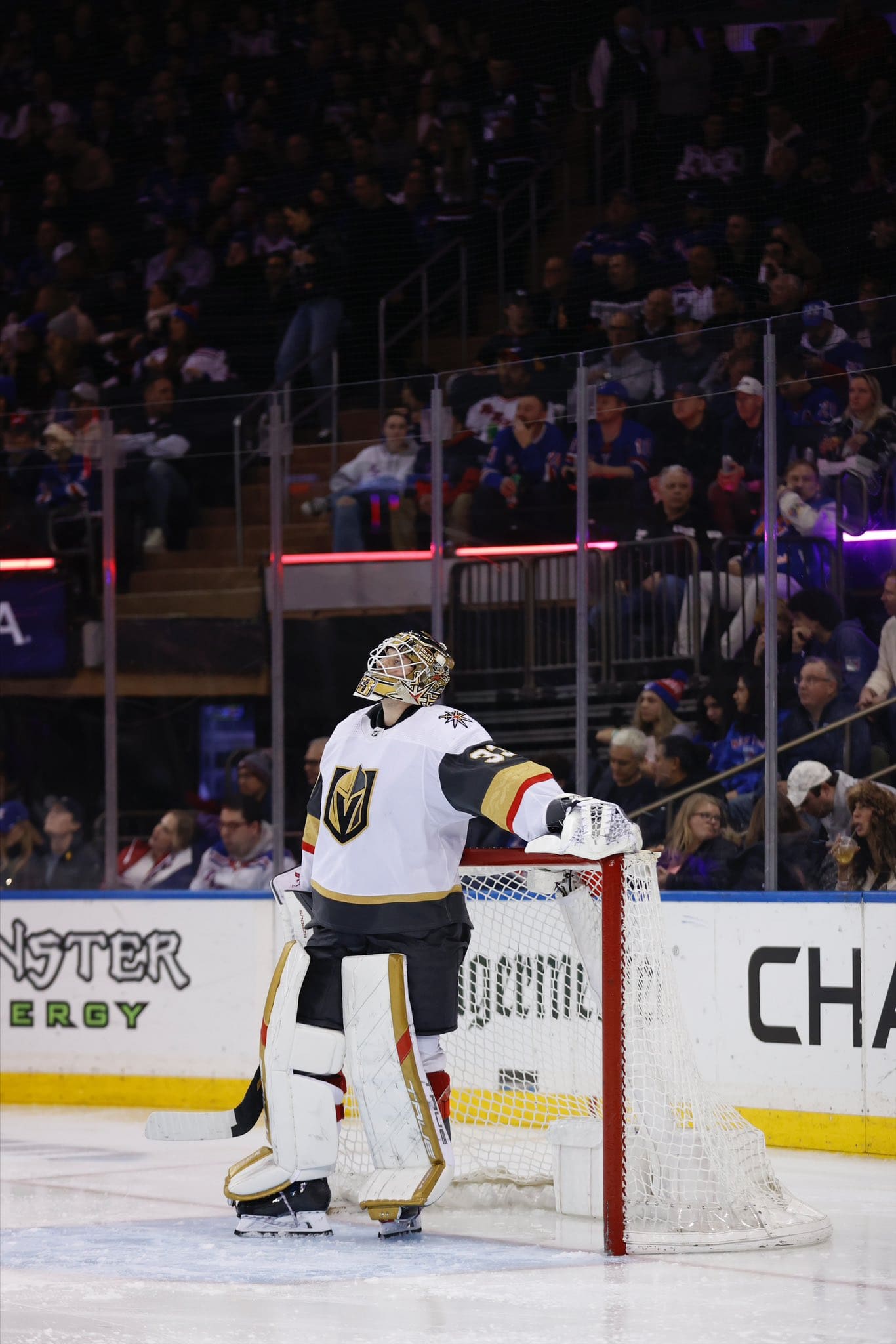Golden Knights Free Agency
Golden Knights Extend Adin Hill! Future Salary Cap Implications

On Friday, the Vegas Golden Knights announced they had agreed to a contract extension with goaltender Adin Hill: six years, $37.5 million. Hill gets a raise from $4.9 to $6.25 million a year. He has a record of 24-11-4 and an average save percentage of .906 through 39 games this season and is fresh off a 27-save shutout against the Columbus Blue Jackets.
The Golden Knights were always going to re-sign Hill. Ilya Samsonov has proved that he isn’t a starting goalie. Akira Schmid is struggling in Henderson with a 7-18-2 record and an average save percentage of .882 through 27 games. And the 2025 goaltending free agent class is weak, so extending Hill was the only logical conclusion.
Hill’s raise is a well-deserved one. Hill is a good goaltender, and he gives the Golden Knights good-to-great goaltending on most of his outings. He can be inconsistent, but which starting goaltenders aren’t in today’s NHL? I can only think of one– Connor Hellebuyck up in Winnipeg– and he’s struggled mightily in the playoffs.
AFP Analytics released Midseason Extension Projections in January for every pending free agent. Granted, this was before the NHL announced that the salary cap would increase considerably. They nailed some of their extension projections but were off on Adin Hill’s.
AFP Analytics projected Hill’s extension to be four years, $22 million— $5.5 million per year. They were off by two years, $750,000 per year, and $15.5 million in total.
Here’s what Hill’s extension means for the Golden Knights salary cap space moving forward:
Losing Free Agents
Now, remember, the salary cap is rising, and it’s going up by $7.5 million. That’s not an insignificant increase. It allows players like Hill to get the raises they deserve. But the Golden Knights can’t afford to keep everyone.
The Golden Knights will have $10.49 million in salary cap space next season. Nic Hague is a pending restricted free agent, and Brandon Saad and Reilly Smith are also up for new contracts. The Golden Knights likely can’t afford to keep them all; if they do, they’ll be right up against the cap ceiling.
You’ve got to imagine that Reilly Smith would be open to taking a team-friendly deal to stay in Vegas. He loves it here; when the Golden Knights traded him to the Pittsburgh Penguins in 2023, Smith never sold his house. He fits in so well with the Golden Knights and has immediately bolstered their penalty kill. I’d be shocked if he walked in Free Agency.
It’s harder to get a read on Brandon Saad. He left a lot of money on the table when he and the St. Louis Blues mutually agreed to terminate his contract– nearly $5.4 million, to be exact. Kelly McCrimmon should certainly try to extend him; Saad has been incredible through 13 games with the Golden Knights. But it would have to be for the right price.
AFP Analytics projects a one-year extension for Nic Hague at around $1.6 million. I’m not sure Hague would sign for that– he’s been playing top-pairing minutes with Shea Theodore out. But who knows?
2026-27 Extensions
Fortunately, the Golden Knights will have $32.625 million in salary cap space for the 2026-27 season, which is when a Jack Eichel extension would kick in. It’s also when Pavel Dorofeyev is due a new contract.
Neither of those extensions will be cheap. Jack Eichel is an elite center who just set a franchise record for points in a single season with 79. He makes $10 million, and he certainly deserves a raise. He could take a team-friendly pay cut, but it will still be a pricey contract. Eichel is a top-tier player and deserves to be paid as such.
At 24, Pavel Dorofeyev is already a borderline superstar, and he’ll only get better. His 26 goals are second on the team behind only Hertl (27), and he’s fifth in points with 42. Dorofeyev leads the Golden Knights in game-winning goals with four. He makes $1.835– that will increase significantly.
Until Eichel and Dorofeyev sign their extensions, McCrimmon must consider them before every decision, every signing, and every trade.












